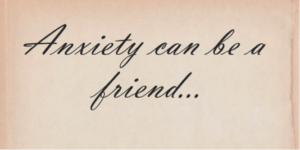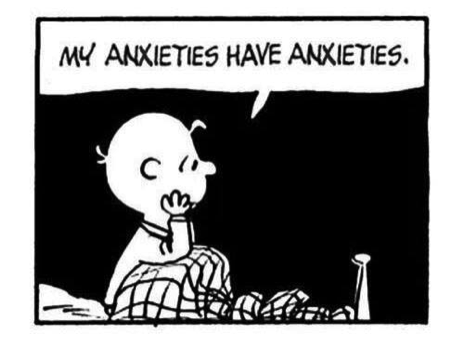By: Lauren Hallerud, MA, LPC
At a time in which the world, our country, finances, education, familial stressors, health care, and a whole host of stressors feel as though they are on the rise, it may feel as though life has only continued to become more stressful and anxiety provoking. While feeling anxious tends to be very uncomfortable for the majority of people, there are some core truths about anxiety that, if revealed and understood, can begin to change the way we approach and manage our anxiety when it creeps up on us or feels as though it consumes us. There are even ways we can use it to our advantage if we are willing to work with it and not against it.
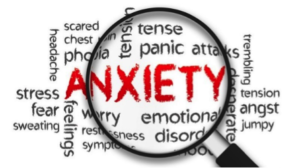
Unveiling the Core Truths about Anxiety
First and foremost, anxiety is an integral and natural part of the human experience – we need to feel anxiety to feel alive. It is one of the core emotions we are meant to feel, it is not out to get you – it is a natural part of life and an innate feeling meant to protect us. This is where the three possible responses to anxiety come into play…fight, flight, or freeze. Anxiety is meant to increase our awareness of what is happening around us and to keep us safe. It is also a motivator! It makes us stop hitting the snooze button and get out of bed in the morning, it makes us finish that paper or task at work within a deadline, it can make us work more efficiently or faster when in a time crunch. In fact, some of us believe that procrastination motivates us to finish tasks, and perhaps it is the anxiety behind it that does!
Onto more good news…Anxiety and panic attacks have natural limits – our bodies can only handle so much, they cannot stay in a state of panic forever. During a panic attack, many people experience intense physical symptoms that feel as though they often begin completely out of the blue (this is in part what makes panic attacks so scary). They tend to peak after about ten minutes and we realistically cannot physically sustain such a heightened state for more than twenty to thirty minutes. Reminding ourselves to “ride the wave” can sometimes remind us that just as quickly as symptoms of a panic attack can physically and emotionally peak, like a large wave, they will come back down. We just need to wait it out and try to remind both our mind and bodies to slow down.
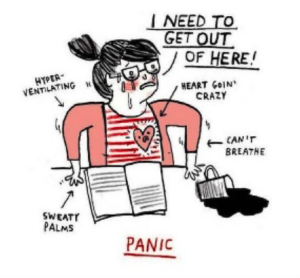
Fortunately, and unfortunately, anxiety attacks will last as long as you allow them to – the more we feed anxiety with our thoughts and worries, giving that thought or worry more power or nutrients, the more it will sit at the table waiting for more. Until we swallow that worry, cut it into smaller pieces, clear it from our plate, or get up and walk away from that worry will it begin to decrease and go away. Anxiety takes what you give it – the more power and worry I give my thoughts, the larger they become. No matter how well we feel like we can mask our anxiety on the outside, ignoring or pushing the worry down, the more I try to suppress it, the greater my stress will become. If we don’t release or get our worries, fears, and thoughts out, they keep brewing and bubbling inside of us – they don’t usually just disappear. Sometimes that can even turn into a panic attack. Avoidance, despite how much of a relief it may feel like for a moment, will ensure our anxiety issues will increase in the future.
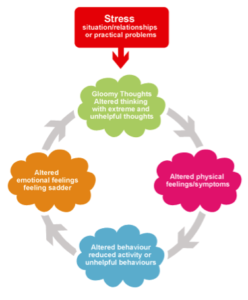
So where do all the racing thoughts and “what if’s” come from? Anxiety typically involves the threat of future loss – this is often where we get caught up in all the what if’s, all the negative possibilities, and worries that may never even happen. The reality is that no one has a crystal ball or really knows what the future will hold, no matter how many times we have let all the potential outcomes run through our mind or have played out a conversation or situation in our mind.
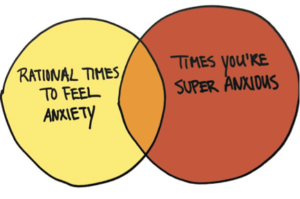
The object of my fear and anxiety is not the problem – often times it is our thoughts about the worry or fear, or our perception of what something means that is the problem, not the focus of our fear or worry itself. For example, let’s take your classic April rain shower. For some, the rain and storms are incredibly soothing, we listen to audio playlists, purchase noise machines to fall asleep to these sounds, or even chase storms. However, some individuals would rather camp out in the basement, crawl into the fetal position, and do everything in our power to cancel out these noises as soon as we realize it is storming. The truth is that the problem is not the weather itself, but my thoughts about the weather and how I am managing those thoughts that can become the problem.
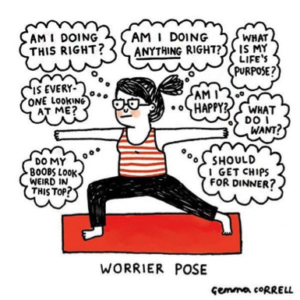
The Least Effective Ways to Manage Anxiety and Your Worries in the Long Run
–Seek reassurance or check things over and over. Asking the same question repeatedly to the same person or multiple friends, family, or coworkers can make us feel as though we are searching for all the answers, exploring every possibility, or helping ourselves make a decision, but often no matter what the response is or how many times we hear it, it will go in one ear and out the other as we have to be willing to trust ourselves and our gut.
–Demand certainty from others. Again, no matter who we ask or how often, no one has a crystal ball and can truly determine the outcome of a future event and give us that certainty that we sometimes so badly desire.
–Try to stop thoughts completely or avoid discomfort. Again, the more we avoid thinking about our worries, the greater they will become. Typically, our worries will return and return larger than before if unattended to.
–Collect only the information and evidence that supports negative thoughts. Being human we all tend to view life through various lens that at times can be very unhelpful or distorted, and we have often trained ourselves to go through life picking out and paying attention to the things that support or validate what we are thinking and what we are feeling. By filtering out the pieces of evidence that do not support our thoughts and feelings or validate our worries, we also sometimes are filtering out reality and the additional possibilities that may also come true.
–Numb yourself with drugs, alcohol, or food. This may sound like a no brainer, yet many of us find comfort in substances or our favorite snacks. While these can certainly feel like a form of relaxation in the moment, we are ultimately avoiding our thoughts again and ensuring they will return.
–Over-prepare – at the expense of taking care of yourself. Planning ahead certainly has its benefits, however if preparing for every possible outcome, packing two extra bags, or working on something all night and losing hours of sleep is what it takes, it may be worth checking-in with yourself, taking a break, putting that laptop down, and ensuring that you are taking care of yourself and your needs first to allow you to get through the next day and perform to your best ability.
–Faking it. You know the phrase “fake it until you make it.” While we can sometimes feel a bit more confident under this mentality and it may help us get through attending that social gathering we have been dreading, the underlying anxiety will not disappear on its own if not worked through and is likely to return again during the next social event.
–Ruminating on a thought. Similar to over-preparing, we sometimes feel as though thinking our way through anxiety, using logic, and replaying every possibility in our mind is only planning ahead and is helpful, however ruminating on a thought often occurs when we have no intent to manage our anxiety or do anything with it outside of our mind.
No matter how unpleasant or overwhelming anxiety can feel, the more we work with it, use it to our advantage, let is serve as a motivator, and attempt to manage it differently with more healthy and effective coping skills, the more comfortable we can begin to feel with the uncomfortable.
